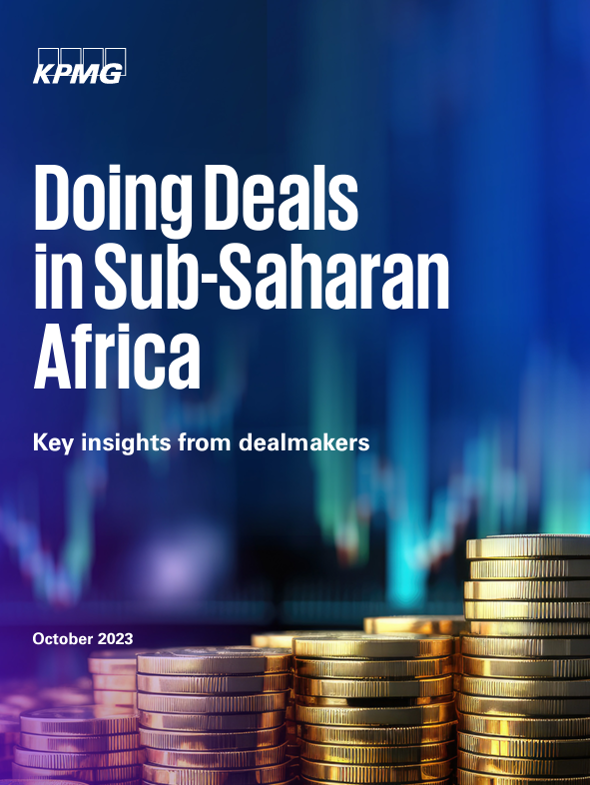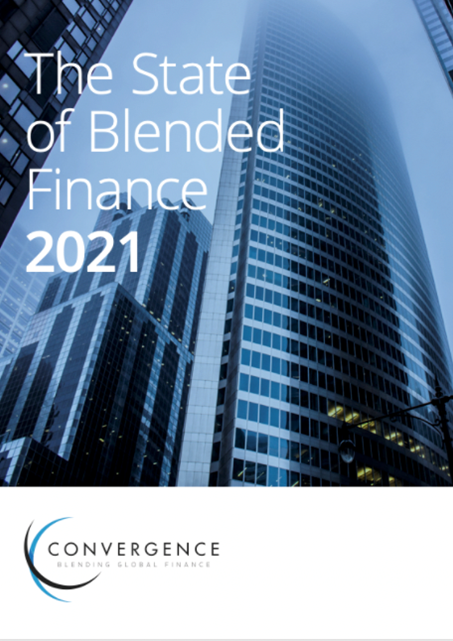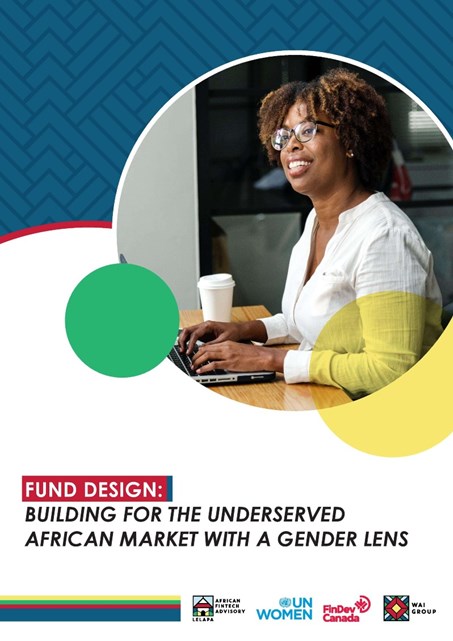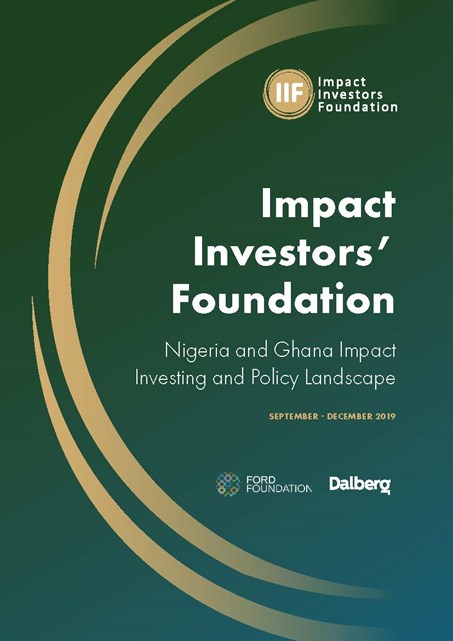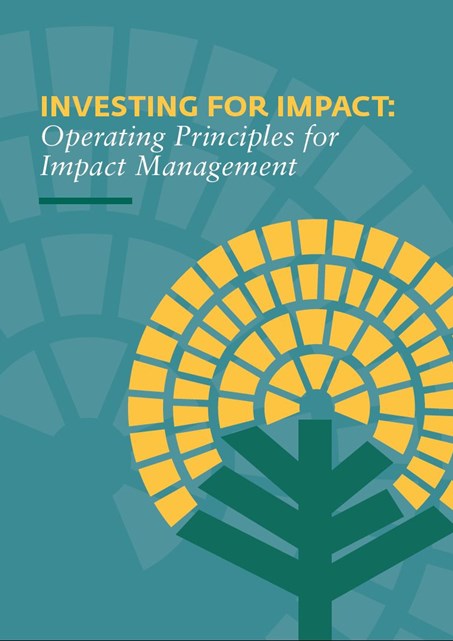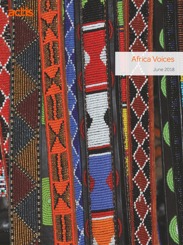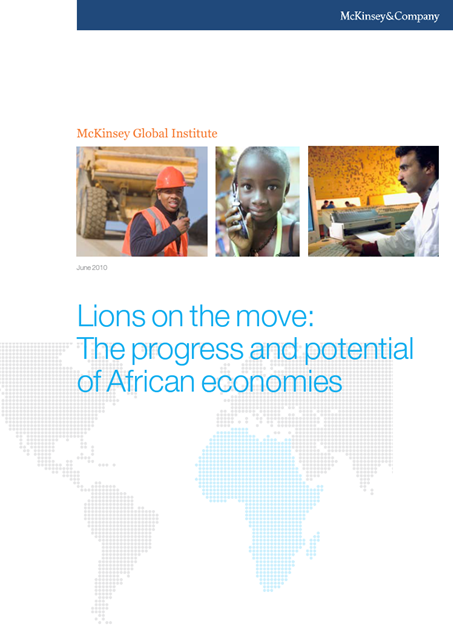Doing Deals in Sub-Saharan Africa
By KPMG
Published: October 2023
Sub-Saharan Africa (SSA) continues to present a significant opportunity for investors. The region's demographics and significant headroom for economic.
Read more »The State of Blended Finance 2021
By Convergence
Published: October 2021
The State of Blended Finance 2021 is the fifth edition of Convergence's flagship annual report. The report uses Convergence's proprietary blended finance data to provide an updated analysis of the blended finance market, including blending approaches, sectors, regions and investor trends.
Read more »Horizon Kenya: Exploring trends set to shape the future in Kenya
By Horizon East Africa
Published: October 2021
Horizon East Africa is a research project dedicated to exploring the trends that are likely to shape the future in East Africa. It aims to contribute to the conversation about what may lie on the horizon so that governments, donors, firms and citizens can take the action needed now to better mitigate looming risks and most effectively grasp the opportunities to come.
Read more »Building for the underserved African market with a gender lens.
UN Women, Findev Canada, Lelapa
Published: September 2021
FinDev Canada, UN Women and the African Fintech Advisory – Lelapa present findings from a workshop that brought together more than 50 DFIs and GPs for an open, honest dialogue on investing with a gender lens in small and medium-sized enterprises (SMEs) in Africa.
Read more »Business case for a new SME fund in DRC
Elan RDC Programme
Published: July 2019
SME’s in DRC struggle to find financing. In fact, 92% of SME’s rely on internal financing according to the World Bank enterprise survey in 2013. This is much higher than the Sub Sahara average of 74%. Financing is needed by SME’s to grow their business and to invest in working capital and assets needed for value creation. Relying on internal financing slows down this growth considerably.
Read more »A Quarter-Billion Dollar Industry?
The DRC Seed Sector
Published: July 2021
Compelling investment opportunities exist for seed companies and seed start-ups in the Democratic Republic of Congo (DRC). This document outlines the market potential and consumer demand trends in the DRC and highlights the high potential of seed production in the country.
Read more »Kigali - A Modern International Financial Centre
By Rwanda Finance in partnership with Africa Legal
Published: April 2021
In this report, Africa Legal and Rwanda Finance—which is the agency with the mandate to develop the Kigali International Financial Centre—surveyed a number of senior professionals and decision-makers from across Africa and globally to help better understand these challenges. Those respondents included CEOs, founders and senior partners active in a wide range of sectors including financial services, providing insights into the issues businesses face when using existing international financial centres. The report also examines what a new and modern African international financial centre would need to attract investment and drive economic growth across African countries, regions and the wider continent.
Read more »Toniic Impact Fund Listing Program
Catalysing deeper positive net impact across the spectrum of capital
Published: February 2021
Toniic Institute is a non-profit global action community for deeper impact investing. The global community is made up of over 350 members in more than 25 countries. Toniic's Fund Platform Listing provides a listing and description of your fund for up to 12 months on our investment platform, accessible to all Toniic members.
Read more »Financing the Sustainable Development Goals
The Contributions of the Multilateral Development Banks
Published: December 2020
The year 2020 marks 75 years of multilateralism since the United Nations (UN) came into existence and 5 years since the adoption of the 2030 Agenda for Sustainable Development and its 17 Sustainable Development Goals (SDGs). The SDGs present a new vision of development for all countries linking people, planet, and prosperity. The financing needed to realize this vision has grown from billions to trillions. With only 10 years to go before 2030, we have entered a Decade of Action to achieve the SDGs. In this context, the multilateral development banks (MDBs) and the International Monetary Fund have come together to highlight our efforts to support countries in achieving the SDGs, by providing finance, technical assistance, policy support, and knowledge.
Read more »Nigeria and Ghana Impact Investing and Policy Landscape
Impact Investors’ Foundation
Published: December 2019
The IIF study on Nigeria and Ghana Impact Investing and Policy Landscape Analysis was released to the public on January 23, 2020 at a formal event held at the Ford Foundation’s Lagos Office. Fifty three stakeholders consisting of representatives from the government, government agencies, bi-lateral and multilateral organisations, foundations, media, investors, educational institutions and social enterprises all gathered at the launch of the report. The findings and methodologies were presented by Dalberg Advisors, after which comments and responses from participants were entertained. In spite of the increased awareness of impact investing within the development and investment communities, information on the impact investing sector remains limited. The Impact Investors Foundation study on Nigeria and Ghana Impact Investing and Policy Landscape Analysis was commissioned to address this gap and to propose policy recommendations. The report builds off the Global Impact Investing Network(GIIN) 2015 study, ‘The Landscape for Impact Investing in West Africa.’ Nigeria and Ghana represented more than half (54%) of impact investing capital in the region, with Nigeria receiving 29% and Ghana receiving 25% of the capital deployed. This 2019 study seeks to understand the extent to which investor experience, deal flow, and outlook have evolved since 2015 and policy has enabled or inhibited impact investing, and in turn to propose policy recommendations that address the issues identified.
Read more »The State of Blended Finance 2020
Published: October 2020
This report uses blended finance data and insights compiled by Convergence to provide an updated analysis of the blended finance market, including blending approaches, sectors, regions and investor trends. We are also excited to include the following additions for the first time to this year’s report: - Interviews with leading experts in the blended finance market, including representatives from development agencies, multilateral development banks (MDBs), development finance institutions (DFIs), impact investors, and institutional investors (‘Voices from the Field’) - A forecast of emerging trends in the blended finance market, leveraging Convergence’s collection of data on transactions seeking blended capital, including from our proprietary matchmaking platform. The State of Blended Finance 2020 concludes with reflections on the journey to advancing blended finance at scale, exploring key challenges and progress made to date. Lastly, the report considers the impact of the COVID-19 pandemic on the blended finance market and the attainment
Read more »Private Equity and Value Creation: A Fund Manager’s Guide to Gender-smart Investing
Published: November 2020
Gender-smart investing is a growing asset class with a compelling business case. Billions of dollars are held in assets under management, in both private and public capital markets, and the opportunities to mobilize capital and invest to close gender gaps are promising and growing. Evidence shows that gender-smart investment strategies can help grow a company’s competitiveness, solidify its supply base, improve its human capital, and help build an overall enabling business environment. By considering the full scope of the business case, companies can unlock opportunities for increased profit, growth, and innovation. While the opportunity is promising, more clarity and guidance is needed by fund managers to understand how to put gender-smart investing into practice. To fill this knowledge gap, IFC, in partnership with CDC and support from the Government of Canada, developed Private Equity and Value Creation: A Fund Manager’s Guide to Gender-smart Investing. The Guide is a practical step-by-step road map for fund managers on how to strengthen gender diversity within their own firms and incorporate a gender focus into investment operations. It combines learnings from CDC and IFC’s experience with over 160 fund managers and draws on best practices with a series of case studies from stakeholders across the industry.
Read more »Guide to Investing for Impact: Operating Principles for Impact Management
Published: March 2020
Read more »Investing for Impact: Operating Principles For Impact Management
Published: March 2020
Investing for Impact: Operating Principles for Impact Management (the Principles) have been developed by a group of asset owners, managers, and allocators to describe essential features of managing investments into companies or organizations with the intent to contribute to measurable positive social or environmental impact alongside financial returns.
Read more »Bright Africa 2018
Segmenting Africa into meaningful markets
Published: March 2019
This report highlights the marked structural differences between regions in Africa. As the continent recovers from the hangover of the latest commodity cycle, it is these structural differences that shape the recovery of the different regions. The private equity industry continues to grow, with deal activity still increasing and asset prices remaining robust.
Read more »Africa Voices
Special publication from the Actis Macro Forum
Published: June 2018
Actis has been on the ground in Africa for over 70 years now, with offices in Johannesburg, Cape Town, Lagos, Nairobi and Cairo today, but with investments across the continent in all of our principal asset classes – Energy, Real Estate and Private Equity. This gives us a unique perspective not only on the macro economic data available to all, but on how the risks and opportunities these indicators point to are felt on the streets of the cities we live and work in. In the years since the publication of the original “Africa Rising” narrative, we have seen a lot of the high hopes expressed at that time severely challenged by the decline in commodity prices, economic and political mismanagement and by a continued depreciation in local currencies. However, and as we have been saying quietly for the past 12-18 months, the frustration and concerns of local business leaders have been very gradually turning into a mood of fragile optimism that growth may be on its way back. The challenges of managing Africa’s demographic explosion remain, but as our contributors to this edition hope to point out, some of the lessons of the past appear finally to have been learned.
Read more »PRI and ERM launch guidance on ESG monitoring, reporting and dialogue in private equity
ESG Monitoring, Reporting, and Dialogue in Private Equity
Published: June 2018
The guidance builds the business case and provides context for the increasing requests for ESG disclosure in private equity; sharing an overview of how LPs are currently monitoring GPs on ESG integration and how they use the information that they receive. This research seeks to propose best practices for flexible ESG monitoring and frameworks for reporting that builds on existing information collected during fundraising in order to streamline information exchange. The guidance is supported by examples of how GPs might respond to the disclosure requests.
Read more »Private Sector & Development
Financing Start-Ups To Build Tomorrow's African Economies
Published: March 2018
With a high population growth rate and a significantly rising GDP between 2007 and 2016, Africa undoubtedly represents a strong potential for investors. And despite some gaps, the venture capital market has a bright future on the continent.
Read more »Lions on the move: The progress and potential of African economies
Published: June 2010
Africa's economic growth is creating substantial new business opportunities that are often overlooked by global companies. Consumer-facing industries, resources, agriculture, and infrastructure together could generate as much as US$2.6trn in revenue annually by 2020, or US$1trn more than today. Africa's collective GDP, at US$1.6trn in 2008, is now roughly equal to Brazil's or Russia's. While Africa's increased economic momentum is widely recognised, less known are its sources and likely staying power.
Read more »Lions on the move II: Realising the potential of Africa’s economies
Published: September 2016
Many people are questioning whether Africa’s economic advances are running out of steam. Five years ago, growth was accelerating in almost all of the region’s diverse economies, but recently their paths have diverged. Some countries have continued to grow fast while others have experienced a marked slowdown as a result of lower resource prices and higher sociopolitical instability. Despite this, the continent’s fundamentals remain strong, but African governments and companies will need to work harder to make the most of its potential.
Read more »The Business of Education in Africa
Published: May 2017
The private sector can help address Africa’s daunting educational challenges, but both investors and policymakers must seize opportunities if it is to do so. This report aims to describe these opportunities in a tangible and actionable way. This new research finds that 21% of African children and young people are already being educated in the private sector, with this percentage likely to rise to one in four by 2021. It identifies an investment need in private sector education in the region of US$16–US$18bn over the next five years, of which about US$1.5–US$2bn is expected to be in the formal sector. This report aims to shine a light on opportunities in education for investors and the opportunities for policymakers to leverage the private sector in their education systems.
Read more »Investing in Development in Africa
How Impact Investment can contribute to meeting the Sustainable Development Goals (SDGs) in Africa
Published: February 2017
The past decade has seen a turnaround in African economic growth. From 1980 to 1989 Africa’s Gross Domestic Product (GDP) grew by an average 1.8% per year. Between 1990 and 2000 GDP growth increased by 2.6% per year and by 5.3% per year between 2000 and 2010. This economic growth is producing a growing African middle class that is now estimated at 350 million people, creating a strong demand for development in industry and infrastructure.
Read more »Pension Funds and Private Equity: Unlocking Africa’s Potential
The Commonwealth Secretariat and Making Finance Work for Africa
Published: May 2014
Pension funds play a critical role in finance through the mobilisation and allocation of stable long-term savings to support investment. This report looks at how Africa can mobilise these domestic resources to support private sector development.
Read more »World Bank 2016 Global Economic Prospects: Sub-Saharan Africa
World Bank
Published: January 2016
Economic activity in Sub-Saharan Africa slowed to 3.4 percent in 2015 from 4.6 percent the previous year. A combination of external and domestic factors was responsible for the slowdown.
Read more »World Bank 2015 Global Economic Prospects: Sub-Saharan Africa
World Bank
Published: January 2015
Sub-Saharan Africa’s growth improved, for the second consecutive year, to 4.5 percent in 2014. Despite headwinds, growth is projected to pick up to 5.1 percent by 2017, lifted by infrastructure investment, increased agriculture production, and buoyant services.
Read more »World Bank 2014 Global Economic Prospects: Sub-Saharan Africa
World Bank
Published: June 2014
Sub-Saharan Africa’s GDP grew 4.7 percent in 2013 led by robust domestic demand, and is set to continue to rise. Despite emerging challenges, the medium-term outlook remains positive.
Read more »SAVCA and KPMG 2014 VC & PE Industry Performance Survey
SAVCA and KPMG
Published: June 2014
This 2014 SAVCA and KPMG survey examines the performance of the private equity industry in South Africa.
Read more »SAVCA and KPMG 2015 VC & PE Industry Performance Survey
SAVCA and KPMG
Published: June 2015
This 2015 SAVCA and KPMG survey examines the performance of the private equity industry in South Africa.
Read more »Environmental and Social Due Diligence: Mitigating Risks, Identifying Opportunities
CDC Group
Published: June 2015
ESDD is a key part of the decision-making process prior to making a new investment. This report looks at how risks are properly managed and potential value-adding opportunities are identified.
Read more »Made in Africa
King & Wood Mallesons
Published: December 2015
This report focuses on the latest legal and market developments, with our partners in Africa that are of interest to investors and businesses operating on the continent.
Read more »Bright Africa 2015
RisCura
Published: July 2015
Africa’s investors have become markedly more sophisticated in recent years. They understand that the continent is one of the world’s fastest-growing regions and that populations are young and urbanising. They also understand that Africa is rapidly adopting technology, is increasingly connected, and is playing catch-up to the rest of the world in terms of living standards.
Read more »International Private Equity and Venture Capital Valuation Guidelines (2015)
IPEV
Published: December 2015
In 2015 the IPEV Board consulted on amendments the International Private Equity and Venture Capital Valuation Guidelines. The IPEV Board periodically updates the IPEV Valuation Guidelines to give effect to changes in accounting standards and enhancements in best practice.
Read more »The Landscape for Impact Investing in East Africa
GIIN
Published: July 2015
The report analyses an active impact investing market across East Africa. Development finance institutions (DFIs) are a significant player in the market, having deployed nearly $8 billion in impact capital to date.
Read more »The Landscape for Impact Investing in West Africa
GIIN
Published: December 2015
The Global Impact Investing Network, in partnership with Dalberg Global Development Advisors, published The Landscape for Impact Investing in West Africa, a state of the market analysis of the impact investing industry in the region.
Read more »Investing in Africa’s Small and Growing Businesses
I&P
Published: May 2015
This handbook is intended for professionals wishing to invest in African SGBs, for African entrepreneurs and more broadly for the sector of SGB investment in the developing world.
Read more »EY 2015 Africa Attractiveness Survey
EY
Published: June 2015
EY releases the fifth edition of the annual Africa attractiveness survey. This milestone is an opportunity to pause and reflect on how Africa’s attractiveness has evolved.
Read more »EY 2014 Africa Attractiveness Survey
EY
Published: June 2014
Africa’s perceived attractiveness relative to other regions has improved dramatically over the past few years. Africa has moved from the third-from-last position in 2011 to become the second-most attractive investment destination in the world.
Read more »Bright Africa 2014
RisCura
Published: June 2014
In 2000, Africa began the long process of catching up to global living standards and economic output. Evidence of this change can be seen in the continent’s share of global GDP, which has grown from 4.2% in 2008 to 4.5% in 2013. This may not seem like much, but increasing the global share of GDP requires countries to outperform global growth levels consistently over time.
Read more »Integrating ESG in Private Equity – A Guide for General Partners
PRI
Published: November 2014
The guide gives GPs practical guidance to develop a framework for the integration of ESG factors into their investment activities, which is linked for the first time with organisational governance, structure and culture.
Read more »